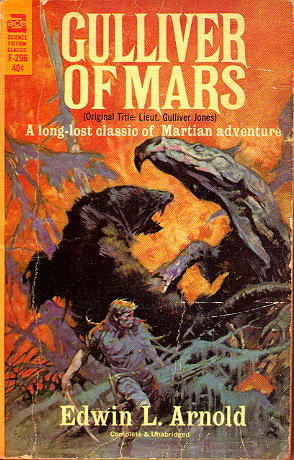Chapter IV — Gulliver of Mars
byChapter IV – Gulliver of Mars begins with a moment of stillness. The protagonist wakes in an elegant Martian chamber, surrounded by silence and strange luxury. As he steps out onto a high terrace, he takes in the vivid colors of sunrise spilling over a city unlike any he’s known. Below, people gather for food in a spectacle of shared ease, but the labor is clearly managed by a distinct group in yellow attire. These slaves, quiet and efficient, form the backbone of a culture that has otherwise surrendered to comfort. There’s no rush, no conflict, only a sense of timeless leisure. It is a life without urgency.
Soon, his friend An appears, bright and welcoming. The government, An explains, is prepared to support Gulliver however he wishes. Politely but firmly, Gulliver declines. He senses that real living means more than resting in comfort provided by others. He craves purpose, not pampering. The ease of Martian life, though tempting, carries an undercurrent of numbness. Their help would come with quiet submission, and that does not suit his nature. He chooses freedom over assistance, even if it means uncertainty.
An invites him to breakfast, offering both food and insight into Martian society. As they walk the streets, Gulliver is entranced by the architecture—grand yet peaceful, aged yet pristine. The people drift about like dreams, enjoying the day without obligation or effort. In time, An explains the culture more deeply. There is no money, no trade, no personal ambition. Martians do not marry or raise families. Children belong to the community, not to parents. Everything is shared, including affection. This collective way of life is designed to eliminate conflict. But it also dulls the spirit.
The narrator listens, fascinated but uneasy. He admires the harmony but senses its cost. Without ownership, without aspiration, what drives a person forward? He wonders if this culture, for all its beauty, has sacrificed growth for peace. An then reveals their deepest fear—invaders from the West. Long ago, these strangers brought ruin. Now, a tribute is sent to prevent more destruction. A girl, a ship, supplies—all offered quietly. It’s survival by surrender, safety through silence. Gulliver is shocked. Resistance, he argues, is better than submission. But An only smiles and says their people prefer peace at any price.
Inwardly, the protagonist cannot accept it. Martians live long, maybe forever, but seem to have lost the will to shape their destiny. Their history is written in stone, their future left untouched. Yet even in this world, there’s something stirring—small flickers of longing. As he walks among them, he sees that not all eyes are empty. The beauty of the city cannot fully mask what has been lost. Without conflict, perhaps they have also lost joy.
Later in the day, he explores more of the city on his own. He sees laughter, love, and calmness, but always with a strange detachment. Romance exists but is shallow, passing like clouds. No bonds form. No commitments hold. Everything is temporary. This unsettles him. It’s not just that the customs are different—it’s that nothing seems to matter for long. Time flows, but nothing leaves a mark. Even the people speak of love like a hobby, not a life-changing force.
Searching for some form of emotional connection, the narrator asks An for a drink that can soften the sharp edge of his longing. What he receives is a Martian wine that alters mood. Upon sipping, he is filled with soaring happiness. He laughs uncontrollably, dancing with strangers, forgetting for a moment the ache of his isolation. The euphoria is total, like sunlight in liquid form. But just as quickly, a second drink is offered—a sobering draught that brings him gently back. The high fades, and he’s left reflective, aware of how thin the line is between joy and illusion.
This interaction reveals something vital about Martian life. Emotions, like everything else, are controlled, moderated, dosed. Even feelings are regulated by custom and potion. Yet Gulliver sees the danger in too much ease. It can become a prison made of silk. He begins to understand why the Martians fear conflict—they have built a paradise too fragile to withstand it. But without struggle, there can be no real triumph.
By the end of the chapter, Gulliver stands at a crossroads—not in location, but in mindset. Mars is seductive in its peace, but peace without purpose feels hollow. The people may have conquered time, but at the cost of forgetting passion. And he, a visitor from a flawed but dynamic world, cannot help but see both the splendor and the sorrow in that. The city shines under a still sky, and yet he walks with questions heavier than before.

